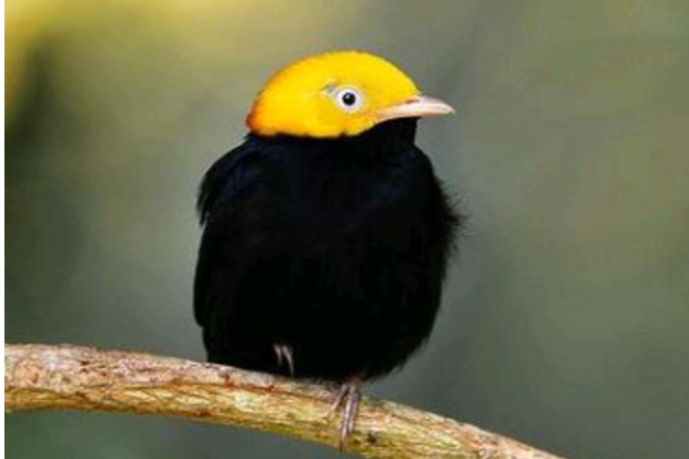A golden-headed manakin
A tiny, compact, and brilliantly coloured passerine bird is the golden-headed manakin (Ceratopipra erythrocephala).
The mature male’s thighs are red and white, and his body is black.
His head is orange-yellow on the forehead, crown, cheeks, and upper neck.
 The border of red is unclear and hard to see on this bright yellow helmet.
The border of red is unclear and hard to see on this bright yellow helmet.
The thin bill has a yellowish-white hue.
He has absolutely white eyes.
Brownish-pink feet and legs With overall olive-green plumage, the female is very different from the male and can be challenging to identify.
Her belly has been washed and is yellowish with lighter underparts.
Instead of white eyes, she has grey ones.

The young person resembles the woman.
Along with the Guianas, Brazil, and northern Peru, these birds can also be found in Panama, Colombia, and Trinidad.
The golden-headed manakin loves moist forests, especially secondary open growth forests.
Although it may even be seen locally up to 2000 metres, it can be seen from a distance of up to 1100 metres.
The majority of the Golden-headed Manakin’s diet consists of tiny fruits and berries, particularly those gathered on the wing from the Miconia, Melastomataceae, and Rubiaceae families.
 However, it will catch insects that are flying or that are hiding in foliage.
However, it will catch insects that are flying or that are hiding in foliage.
Each male holds a horizontal perch between 6 and 12 metres in height and darts or leaps to other perches.
The show is accompanied by the zit-zit call and the whirling of the wings.
Up to 12 birds in a flock can act simultaneously.






